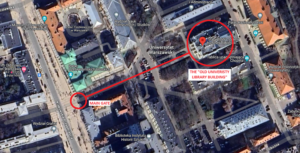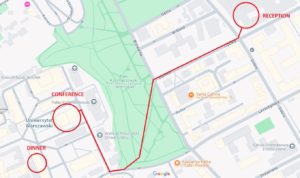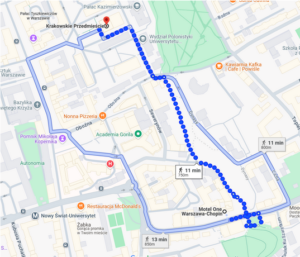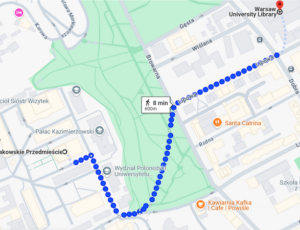Transitions in Youth (TiY) 2024
31st ANNUAL WORKSHOP TRANSITIONS IN YOUTH (TIY)
Warsaw, Poland, 4-6 September 2024

The 31st annual workshop of the European Research Network on Transitions in Youth (TiY) will take place in Warsaw, Poland on 4-6 September 2024. The workshop will be hosted by the Faculty of Sociology, University of Warsaw.
The theme of this year’s workshop is:
Youth Transitions in Vulnerable Populations: New Challenges in Uncertain Times
Recent years have been marked by a series of unprecedented and consequential developments: digitalization and the rise of artificial intelligence, the COVID-19 pandemic, and mass migration driven by wars and economic disparities – which will deeply transform European societies for decades to come. These global phenomena are reshaping the challenges faced by young people navigating their transition into adulthood, by exacerbating existing inequalities while introducing new sources of vulnerability. Youth from socio-economically disadvantaged backgrounds experience a higher risk of early school leaving and persistent or recurring episodes of joblessness. Refugees and asylum-seeking youth, compelled to navigate unfamiliar legal frameworks and cultural landscapes, encounter numerous obstacles as they strive to integrate into European societies. These and other vulnerabilities, such as those related to spatial divides, gender orientation, or poor health status, expose youth to multiple barriers in the pursuit of happiness and socio-economic progress. Simultaneously, the rise in AI technologies amplifies the uncertainty of youth transitions by reshaping labour markets, leading to transformations in many job sectors and displacement in others.
More research is needed to better understand the specificity of the life-course dynamics experienced by various groups of contemporary vulnerable youth and the challenges they are facing in their efforts to access vocational training, higher education, and the labour market, or to establish their own lives.
For the 31st annual TIY workshop, the Network Committee invites authors from disciplines in the field (Economics, Education, Psychology and Sociology) to submit contributions that focus on the transitions of vulnerable youth in a variety of life domains. To increase our understanding of the specific barriers that vulnerable youth face while transitioning to adulthood, different sources of vulnerability and their intersections may be considered. Papers on the long-term effects of vulnerabilities on occupational attainment, living conditions, health and well-being are also welcome, as are critical and theory-driven analyses of policies and interventions to support the transitions of vulnerable youth.
Specific topics that may be included are:
- The role of educational, health or spatial inequalities in school to work transitions (StWT)
- The transition to adulthood of young refugees and migrants
- NEET episodes in the StWT
- COVID-19 effects on the dynamic of health, wellbeing and other domains of young people’s lives
- Intersectionality and its impact on transition experiences
- The role of economic and structural changes, such as globalisation, digitalisation, and robotization, on youth transition patterns and their life-course consequences;
- Outcomes of policies to address vulnerabilities for youth transitions, labour market outcomes and overall well-being;
The above list of themes is neither complete nor exclusive. Theoretically grounded empirical research on other aspects of youth transitions that is based on high-quality longitudinal data, experimental and intervention studies is also welcome. Additionally, the committee invites conceptual contributions, systematic reviews, and meta analyses.
We are pleased to announce that Prof. Anna Matysiak, head of the Interdisciplinary Centre for Labour Market and Family Dynamics (LabFam) at the University of Warsaw, will be the keynote speaker at the event.
Local organising team: Anna Kiersztyn, Katarzyna Kopycka, Paweł Downarowicz, Stefan Bieńkowski,
E-mail: tiy2024@is.uw.edu.pl.
The long-term goal of the Transitions In Youth (TIY) Network is to advance theoretical understanding of transitions in youth through the comparative analysis of regular and longitudinal surveys of transitions. The TIY Network brings together social scientists interested in the transitions of young people as they progress towards adulthood. The focus is on the transition from education to the labour market, but in the context of other transitions, for example to a new family status or to an independent household. The principal activity of the Network is to hold annual workshops on specific themes. Apart from these workshops, the Network serves as a forum for researchers. Information on the Network’s activities are distributed through the Network’s email list.
Network Committee
- Paolo Barbieri, University of Trento
- Hans Dietrich (chair), Institute for Employment Research (IAB)
- Cristina Iannelli, University of Edinburgh
- Irena Kogan, University of Mannheim
- Luis Ortiz, Universitat Pompeu Fabra, Barcelona
- Emer Smyth, Economic and Social Research Institute (ESRI)
- Dieter Verhaest, Katholieke Universiteit Leuven
- Maarten Wolbers, Radboud University Nijmegen
The 31st Annual Workshop on Youth Transitions will be held at the University of Warsaw. The conference will be held in three locations:
- The sessions will take place in Room 107 of the Old Library building https://maps.app.goo.gl/uZbhgykWVDdYDdLv6
- The Dinner will be held in the Columned Hall at the Faculty of History https://maps.app.goo.gl/D1Aw1R4tTnHrpHDv9
- The Reception will take place in the New Library building, Dobra Street 56/66 (room 097, ground floor) https://maps.app.goo.gl/ZKREpenvYRWghP5Q9
Workshop venue
The workshop itself will take place in room 107 in the “Old University Library” situated at Krakowskie Przedmieście 26/28 in Warsaw. This neoclassical building holds a central location on the main campus of the University of Warsaw, in the city center, just 10 minutes away from the old town by foot.
This historic library not only stands as a significant academic center but also provides an exceptional venue for conferences. The building is wheelchair accessible, ensuring inclusivity for individuals with disabilities. Furthermore, it has recently undergone renovations, creating a well-maintained and modernized environment suitable for various events and gatherings.
How to get to the venue
The Old Library building is situated in the center of the main campus, a 1-minute walk from the main gate to the University. Due to the current university policy, access to the Campus is restricted, and a conference badge is required to enter the Campus. These restrictions do not apply to the New Library area.

The map below shows the location of the New Library, where the reception will take place, and the Columned Hall, where the dinner will be held, as well as how to reach them.

The main building (Old Library) is easy to access by public transport; however, currently, due to road repairs, the bus stops have been relocated and are about 10 minutes away from the conference venue. Therefore, the best option for getting around is walking. The conference venue (Old Library) can be reached from Motel One in about 10 minutes on foot (see map).

The Faculty of History building is located on campus, 50 meters away from the Old Library. The New Library building is located off-campus, and the easiest way to reach it is also on foot. It’s about a 10-minute walk through the park, as shown on the map below.

In case of any problems, ask the organizers or use Google Maps or other applications, which should provide adequate information about the location and public transport.
The conference fee is set at €200 (which covers the venue, welcome meeting, coffee breaks, lunches and conference dinner). The local organizers will provide advice on accommodation close to the conference venue upon paper acceptance. To ensure the smooth running of the preparations for the workshop, participants are requested to register and pay the conference fee by June 15, 2024. To make papers available to workshop participants in advance, final (electronic) versions should reach the local organizers by August 25, 2024.
The link to the registration form will provided by the organizers upon paper acceptance.
Accommodation is not included in the conference fee.
We recommend staying at the Motel One Warsaw Chopin hotel, as it is within walking distance from the conference venue and in the city center, near all tourist attractions. A number of rooms have been pre-booked for workshop participants at Motel One, with a discounted rate. To avail of the discount, reservations must be made by June 15, 2024. More detailed information and the discount code will be provided by the organizers.
Link to Motel One Warsaw Chopin
Additionally, there are plenty of hotels and budget accommodation options such as hostels in Warsaw. The best areas to stay are the city centre called “Śródmieście” and “Powiśle”. For a short stay, it is best to stay within walking distance from Krakowskie Przedmieście or Nowy Świat streets.
If you need any information, feel free to contact the organizers.
Warsaw is easily accessible by train, airplane, or car.
(1) By Train: Polish State Railways (PKP) maintain direct connections to Warsaw from virtually all major cities in Poland, including Krakow, Gdansk, Wroclaw, Poznan, and Katowice. Warsaw is also well-connected by train to other European cities such as Berlin, Vienna, Prague, or Budapest. The main train station is centrally located, and it takes approximately 15-20 minutes by public transport or 10 minutes by taxi to reach the workshop venue.
(2) By Airplane: the most convenient way to reach Warsaw by plane is to arrive at Warsaw Chopin Airport. Travelers will find regular bus connections from the airport directly to the venue and the city center, taking about 45 minutes by public transport (for approximately 1 euro) and 25 minutes by taxi.
Feel free to contact the local organizers if you need any assistance!
Abstract submission deadline:
April 1, 2024
Decision about abstracts:
May 15, 2024
Registration (and payment) deadline:
June 15, 2024
Paper submission deadline:
August 25, 2024
Local organising team:
Anna Kiersztyn, University of Warsaw,
Katarzyna Kopycka, University of Łódź,
Paweł Downarowicz, University of Warsaw,
Stefan Bieńkowski, University of Warsaw.
tiy2024@is.uw.edu.pl